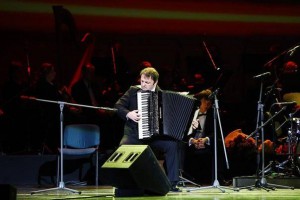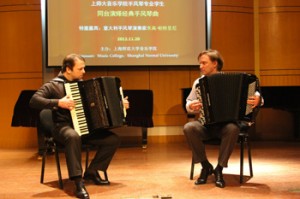 Virtuoso accordionist and businessman at the same time. Mirco Patarini tell us his musical career since the early steps in childhood, when the accordion was not an instrument so popular in classical music. Then, the important decision to buy one of the most prestigious brands of accordions…
Virtuoso accordionist and businessman at the same time. Mirco Patarini tell us his musical career since the early steps in childhood, when the accordion was not an instrument so popular in classical music. Then, the important decision to buy one of the most prestigious brands of accordions…
You went to a private school when you were very young, and then you took part and won many national and international contests. One of those, perhaps, would undoubtedly mark your destiny, but we are going to talk about this later … Why did you choose the accordion?
“I have an uncle, Franco, he was an accordionist since I remember him, a self-thought one. My parents wanted for my brother Moreno and myself to study music, in parallel with regular school, and so my uncle introduced us to an young accordion teacher from Spoleto, Renzo Tomassetti. He was a person full of enthusiasm and a great motivator. We learned very fast. Also, we immediately became passionate for participating in contests and traveling around Italy. We had the opportunity to meet lots of musicians and make new friends.”
Do you think there are similarities between the methodologies and repertoires that you experienced in your training process and current programs adopted by various teachers of the conservatory?
“Without any doubt a lot has changed; at the end of the 70s the main method of study for accordion in Italy was based on piano technique, and in fact the piano accordion was much more widespread than button instruments. In these years accordionists experimented a lot, the use of the bellows was still somewhat rough, the free bass were already existing but not really thought. We heard talking about other schools in Northern Europe and in the URSS, but we are talking about a time without Internet, fax, when traveling was not easy, when boys were studying English language in a very basic way, so the current communication system seemed distant, almost fairytale … Teachers tried to experiment, talking to each other, they recorded the concerts and exchanged audio-cassettes. There were (few) teachers with a good musical education, but there was almost no teacher who was able to play at the level that the students reached soon. It has been three decades, but it seems like an eternity.”
In the past, and I’m talking about the 80s and 90s, you were also the leader of an accordions orchestra (fisorchestra) … What do you remember of that experience?
“As many private teachers in Italy and abroad, Renzo Tomassetti tried to involve as many students as possible to experience music together. It was not easy at that time to cooperate with schools of other instruments, and it was not even easy to get scores, or even prepare transcriptions or arrangements, to create groups of chamber music mixed. We do not forget also that the accordion, a little bit because of prejudice and a little bit for a reason, did not enjoy great reputation among the music community, and so the most logical answer was to create an Accordion Orchestra. From a musical point of view it was quite clear to us, very young students, that the result was mediocre or sometimes just decent, the problems due to the heterogeneity of the students and, above all, the differences of instruments, led to play somewhat orchestral or operatic music famous, however, to the joy of our families and the spread of the accordion around the city. I also met, however, accordion orchestras of very high level, especially with limited number of musicians. In any case, our ‘Fisorchestra Santa Cecilia’ did much to cement relations within the group of students that formed, and in some cases I remember mixed groups from different schools in the cities of Spoleto, Foligno and Terni.”
Is there a particular accordionist who influenced “the way you play”?
“As I said before, during the first years of study the accordion was evolving, above all, in those years, at the level of instrumental technique. I remember with great pleasure Gervasio Marcosignori and Wolmer Beltrami, who I had the opportunity to listen live concerts many times. To be honest, the strongest impression was listening a concert of the Quintet of Warsaw, in Castelfidardo. An amazing group, I never ever heard again another group of accordions playing at that level. As I said, however, at this time we were listening music discs, recordings, which were not easy to find. Renzo Tomassetti, searching recordings and music scores, had a great tenacity and unique talent. I was impressed listening the recordings of Lips and Semionov, also because I had no idea how their instruments were made… And I loved an American LP with the compositions of Tito Guidotti, an extraordinary musician and composer, who nobody plays today, unfortunately.”
Currently, do you think there are still big differences between the Eastern European schools, which have unquestionably dominated the scene of the recent past? What do you think about the new generation of accordionists? What is the level of training in our conservatory of music and, in your opinion, is there a prominent feature among many?
“The school of the East? We can say school of (ex) URSS. It is not correct to say that the school of East dominated the scene, is not quite exact, there are many areas that have not been contaminated by the very Russian school and who have had very different developments, such as the northern European: Mogens Ellegaard in Denmark, one of the fathers of the ” Classic” accordion, he always had many contacts and co-operations, among others, with Lech Pucnowski in Poland and also with russian musicians, but his path and its evolution was very different. In Italy, We all know the great work of Farfisa company (The Farfisa Edition today is Berben) to create a repertoire and methods of study, so musicians like Gervasio Marcosignori, Luciano Fancelli, Felice Fugazza, became very popular. But we can not forget that Salvatore Di Gesualdo, for exemple, took a different route in his career. We need a treaty to deepen this issue … Today, I believe that, apart the diatribes on the differences of instruments, there are also big differences on important musical issues, especially on the execution of pre-accordion music, or periods of Baroque, Classical and Romantic. I believe, however, that Italian conservatory of music, in general, is not inferior in any way to those of other countries. Obviously, the quality of each class school of accordion depends on the teacher … we have, like for others instruments, excellent, good, and so and so teachers. Personally, I have a particular fondness for Corrado Rojac, a truly talented studios of music at 360 degrees, but he is also a great performer. It is also true, however, that there are teachers with less musical culture but with a great capacity to motivate the students in a magnificent way, and to create good musicians also from ordinary talents.”
 Do you feel you are more ‘contemporary’ or ‘traditional’ ? What do you think about modern musical languages?
Do you feel you are more ‘contemporary’ or ‘traditional’ ? What do you think about modern musical languages?
“This is another complex argument. I believe that, just like the whole culture, music is in constant evolution and the musical language continually seeks new opportunities. The exploration of the expressive possibilities of the accordion and phonic sound attract many composers, especially now, because many students are capable to use the technique very well. I like to follow with great pleasure the initiatives that combine in joint projects students of the conservatory accordion, composition and various other instruments. The problem is, in my opinion, that in many cases, intelligent composers, prepared, educated, cultured… they miss that magical gift that elevates them to the status of artists, no more and no less it happens with painters, sculptors and artists in general. These attempts, however, are always appreciated, they are sometimes the beginning of composers who then grow in their career, in other cases the experiments remain important contributions to the repertoire or to teaching, both of accordionists and composers.”
What system of free bass do you play and why?
“For several years I played with the quint system free bass, first the six rows and then to eight. After that I played for about one year a button instrument with c-griff free bass. At the end, I chose to keep the piano accordion with c-griff free bass. In any case I think the problem of the system is secondary to the music, you may very well play at a high level with any system… Corrado Rojac, which I mentioned before, played for years with the piano accordion quint sistem free bass and then he decided to change completely and play button instrument “Russian system”, both right and left. And we have not to forget, for example, Fabio Rossato, fantastic performer, playing even a c-griff button accordion to the right hand and a quint system free bass on the left.
In any case, however, I would not be honest if I said that the existence of various systems is not a problem. Today we have these systems:
RIGHT HAND KEYBOARD:
– piano accordion
– button c-griff
– button b-griff
– button finnish
LEFT HAND KEYBOARD
– standard bass (Stradella), two bass rows and four chords
– system with three bass rows and three chords rows, in two versions (with minor third or augmented quint)
– belgian system (identic to the ‘Modenese” system, almost disappeared today)
LEFT HAND FREE BASS KEYBOARD
– additional rows, three or four, close to the bellows c-griff system
– convertor c-griff system
– convertor b-griff system
– convertor Finnish system
– convertor ‘Russian system’ (reversed b-griff)
– quint system
 In addition to this variety of systems, we also have uneven pairings, more often than we think. It is clear that, even if from a musical point of view we can arrive to play well any system, such variety of configurations become a problem for didactics programs, and also for the production time and the costs of the instruments. My feeling is that we are moving towards the system b-griff on the right hand and the “Russian” to the left. I disagree with those who as a matter of “logic” or ergonomics, every system has conditions favorable or unfavorable depending on what you play. I just want to say that, knowing very well the dynamics of the nowadays market, I see a direction more and more pronounced. Certainly, it does not mean that other systems will disappear … try, for example, to go to South America WITHOUT piano accordion…”
In addition to this variety of systems, we also have uneven pairings, more often than we think. It is clear that, even if from a musical point of view we can arrive to play well any system, such variety of configurations become a problem for didactics programs, and also for the production time and the costs of the instruments. My feeling is that we are moving towards the system b-griff on the right hand and the “Russian” to the left. I disagree with those who as a matter of “logic” or ergonomics, every system has conditions favorable or unfavorable depending on what you play. I just want to say that, knowing very well the dynamics of the nowadays market, I see a direction more and more pronounced. Certainly, it does not mean that other systems will disappear … try, for example, to go to South America WITHOUT piano accordion…”
What happend in 1984 in Switzerland? Can we say that from this moment your life had changed indeed?
“This argument about the contests, especially international, is long and manifold. I was thinking since a long time to write an article to explain very well my opinion; but I can say this: my life had changed indeed in 1981 in Castelfidardo, when I was 15 years old and I took part to the Trophée Mondial CMA. Try to imagine a 15 years old boy never went out of Spoleto, who suddenly discovers that there are in fact living Americans who speak English, Russian speaking incomprehensible language, and “Czechoslovak”, Hungarian, Polish, Spanish … and that all of them are boys and girls with their teachers, and they all play music, smile, eat and walk with me, they have the same curiosity and wonder. I remember a week when I gave myself an identity, a group of new friends with whom I communicated with difficulty, but to whom I felt much closer than to my classmates. When I returned to Spoleto I was different, I just had discovered that the world was large, and there were so many people to get to know. Without that experience, I would not probably have had the strength to overcome difficult moments. And in 1983, at the age of 17, always for the Trophée Mondial CMA, I started traveling to Venezuela, as well as the following year in Switzerland, where, finally, I won the first prize. I don’t remember very well the contest, but I have a clear memory of my “performances” (also the mistakes …), what had impressed my mind and heart were the people, the musicians, the new pieces, techniques never seen before, the faces of legendary performers or composers.”
(continue)
Questo post è disponibile anche in: Italian

 English
English Italiano
Italiano 





Leave a comment
You must be logged in to post a comment.